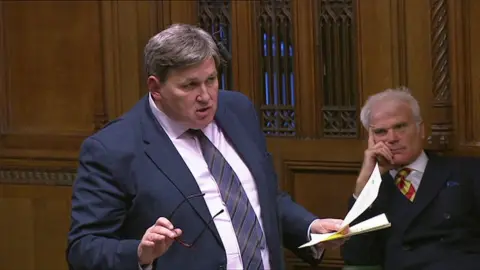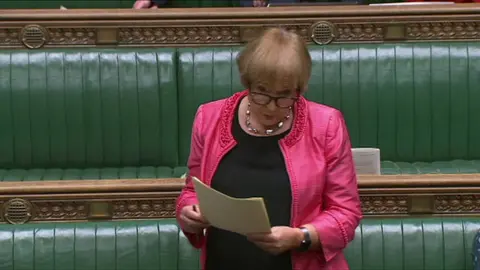Conservative MPs express concern over Israel boycott bill
 House of Commons
House of CommonsTory MPs have criticised a government bill which would ban public bodies from boycotting Israel as a "violation of freedom of speech" and "draconian".
Ex-minister Kit Malthouse said it risked "playing into the antisemitism" that has increased in the UK recently.
The bill imposes a ban on public bodies making their own direct or indirect boycotts, disinvestment or sanctions campaigns against other countries.
Communities Secretary Michael Gove said it would help to fight antisemitism.
The government says the bill would guarantee foreign policy remained a UK government matter.
The Economic Activity of Public Bodies (Overseas Matters) Bill, known as the anti-BDS bill, seeks to prevent public bodies, including councils, from campaigning against, boycotting or sanctioning a particular international territory - unless that is endorsed by the UK government's own foreign policy.
It aims to limit the reach of the Boycott, Divestment and Sanctions (BDS) movement, which calls for broad-based economic and cultural boycotts of Israel and Israeli settlements in the Occupied Palestinian Territories.
The BDS movement is widely backed by Palestinians and anti-occupation groups in the UK. Israel sees it as antisemitic - as do the United States and Germany - and has supported moves by other governments to outlaw such boycotts by public bodies. The issue is highly controversial, often sparking rows and protest among rival groups supportive of Israel or the Palestinians.
The BDS says it opposes racism including Islamophobia and antisemitism.
During a debate on the bill in Parliament a number of MPs including some Conservatives and a senior Labour MP strongly criticised the legislation.
Former Home Office minister Mr Malthouse argued against a section of the legislation which would forbid public authorities to say they would back a boycott if it was lawful.
"To not even be able to express opposition to the law whilst still complying with it seems to be very un-British, extremely illiberal and unnecessarily draconian," he said.
Another former Conservative minister, George Eustice, said it was a "violation of freedom of speech".
The bill gives the government the power to make certain countries exempt from the boycott restrictions.
However, it does not allow the exemption of Israel, the Occupied Territories or the Occupied Golan Heights, specifically naming these areas in the legislation.
Mr Malthouse told MPs: "In carving out Israel, the West Bank and the occupied Golan Heights in the legislation, the secretary of state is, I'm afraid, playing into the antisemitism that we've seen rise in this country over the last few weeks."
Senior Jewish Labour MP Dame Margaret Hodge also expressed a fear that the bill would strengthen polarisation at a time when the Israel-Gaza war had already heightened community tensions.
She told MPs: "To bring this wrong-headed, poorly-drafted politically-motivated bill back in the midst of these horrors we are seeing every day… is an act of complete irresponsibility and unbelievable foolishness."
 House of Commons
House of CommonsMr Gove robustly defended his bill, insisting it would not undermine free speech or prevent local authorities from taking into account human rights considerations when making decisions.
He told MPs that the bill had the backing of the representative bodies that speak for Britain's Jewish community.
He said: "When they are so clear that this legislation is in the interests of community cohesion, fighting antisemitism, and making the United Kingdom a safe house for everyone, when they are so clear, we should treat their words with respect."
The bill was also backed by Conservative MP Theresa Villiers who said local authorities should be focused on "delivering services not conducting their own foreign policy".
Another Tory, Andrew Percy, disagreed with MPs who said the bill should not be brought forward while tensions were running high. "Are we waiting until Hamas give us permission," he asked.
Amendments from Labour, Conservative and SNP MPs were defeated and the bill continues its progress through Parliament.
